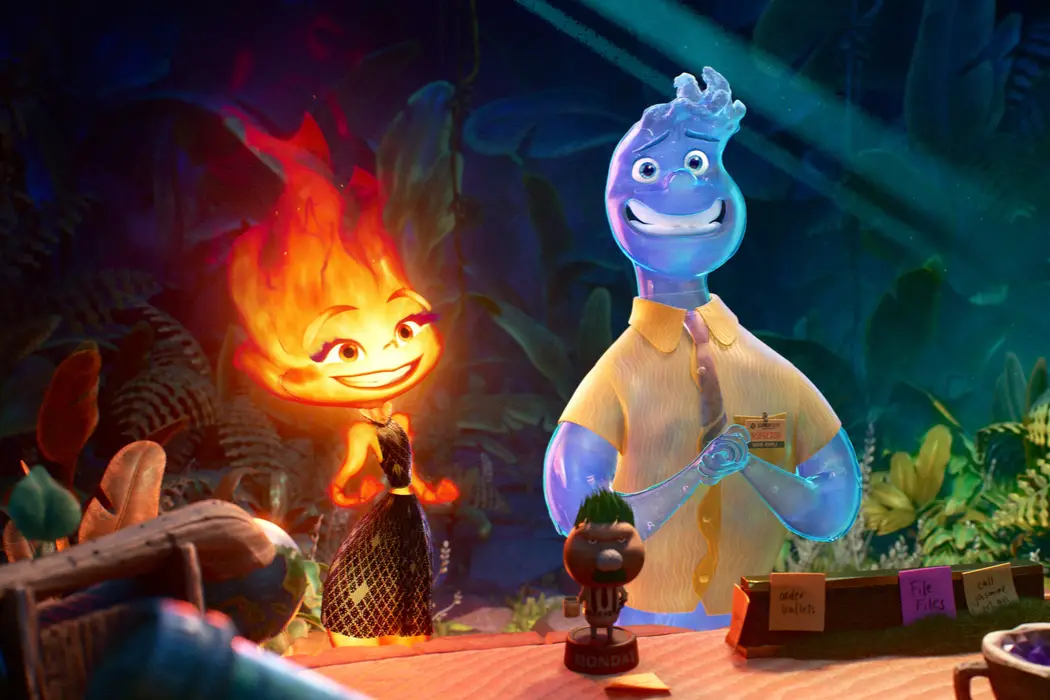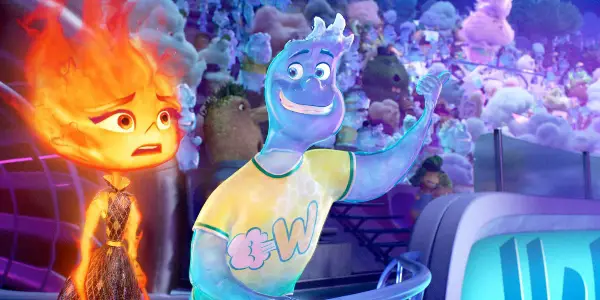ELEMENTAL And The Perils Of Mis-Marketing

Hello, I'm Coby Kiefert! I am a reviewer from Savannah,…

If Pixar’s latest offering suggested that Fire and Water can mix, the same can’t be said for misleading advertising and good box office numbers. Elemental followed a (literally) fiery woman named Ember (voiced by Leah Lewis) joining forces with city official Wade (voiced by Mamoudou Athie), of the water faction, to save her immigrant father Bernie’s (voiced by Ronnie Del Carmen) business from going under. However, in doing so, the pair discover they have much more in common than they thought, which sparks a romance between them. If you were one of many who saw the trailer, though, all of this would probably come as a surprise to you.
My Thoughts
Believe me, you’re not alone. When I initially saw the trailer for this picture, I merely thought, “That looks like it could be kinda cute.” If I were hard-pressed, I’d elaborate that it looked like Pixar’s Zootopia, but with a romantic twist. When I sat down in my local AMC, though, and actually saw the film, I was pleasantly surprised how much I enjoyed it, as well as by its heartwarming themes about sacrifice, family, and the immigrant experience, which owes credit to the story’s basis in director Peter Sohn’s own life. On the flip side, though, I was not surprised how much the movie eventually made over the course of its theatrical run.
Why Did It Bomb, and Why Did It Fail to Connect with Audiences?

According to IMDb, Elemental had a production budget of $200 million, but only grossed $489,452,209 globally- that’s barely breaking even- with a $154,426,697 gross in the US and Canada, making it a certified bomb in North America. As if that weren’t bad enough, according to The New Yorker, it “earned less than thirty million dollars at the U.S. box office during the Juneteenth long weekend- the worst opening in the company’s history.” Audience feedback bolstered the theory that Pixar’s confused ad campaign was the culprit. According to MovieWeb, “In a Reddit thread titled, ‘I genuinely feel so bad for Peter Sohn’, one user stated, ‘It’s like they were trying to trick people into seeing an opposites-attract trope, then switched it up with a lovely immigrant tale. I wish they just told us what it is, because that story is way more interesting to me.'” You’ve got a clear idea of the overarching critique moviegoers had with this all-over-the-place advertising.

What Lessons Should Pixar Take From This?
In my opinion, there’s a few particularly vital lessons Pixar should learn from the underwhelming (to put it mildly) box office performance of Elemental. The first, and most obvious: Embrace the distinct perspective of your story! I understand why the company would’ve had the impulse to market it as a rom-com, but leaning into the immigration aspect of the story, as well as the fact that Wade and Ember’s romance is interracial, would’ve sold more tickets. After the warm reception of such diverse films as the Oscar-nominated Luca (2021), or the Oscar-winning Coco (2017), such a move has proven to be a winning formula.
As a result, critics might also have not zeroed in on the movie’s shortcomings as mercilessly as they did. When referring to Elemental’s world-building, Isaac Feldberg, a contributor to RogerEbert.com, noted that “the film…aims high with that central metaphor but is immediately set off-balance by its unwieldiness as racial allegory, an issue compounded by pacing and writing so flatly predictable it suggests a Pixar film authored by an AI algorithm.” Peter Debruge of Variety wrote “In its over-designed Nuevo-New York way, Element City feels an awful lot like Zootopia, but with gelatinous blue blobs (Water) and glowing orange torch-people (Fire) in place of animal species.” It’s not a leap for one to conclude those elements (no pun intended) could’ve avoided such a roasting if the picture had been marketed honestly.
So Where Do We Go From Here?

Going forth, Pixar really just has to focus on advertising their more diverse films by leaning into the unique angles they possess. Just because it’s an idea your company hasn’t tried before in their work, doesn’t mean it can’t or won’t contain aspects easily accessible to your core audience. Luca, for instance, functioned on a surface level as a coming-of-age tale about two friends who overcome the prejudice of a sea monster-hating human world. Many read into that an LGBTQ angle, a racial angle, etc., and yet the movie still worked as straightforward entertainment with mainstream appeal. Having seen it upon its initial opening in cinemas, I personally think Elemental is far more moving, entertaining and less confusing in its world-building than critics gave it credit for. But I won’t pretend the biggest criticism of all wasn’t founded.
Does content like this matter to you?
Become a Member and support film journalism. Unlock access to all of Film Inquiry`s great articles. Join a community of like-minded readers who are passionate about cinema - get access to our private members Network, give back to independent filmmakers, and more.
Hello, I'm Coby Kiefert! I am a reviewer from Savannah, GA. I'm most passionate about independent horror, dark comedy, and teen coming-of-age films. However, I'm open to all types of cinema. I'm excited to be writing for this website.













